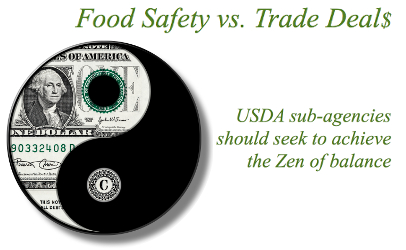A seemingly minor component of the USDA reorganization plan released last week could have a negative impact on food safety as the plan gets implemented. Much of the focus has been on the creation of a new undersecretary for trade position, but the plan also calls for the establishment of an interagency committee that would coordinate agricultural trade policy. This committee would be chaired by the new trade undersecretary and would include, among other agencies, the Food Safety Inspection Service (FSIS).
While some coordination between food safety and trade is appropriate, the inclusion of FSIS on such a committee is potentially troubling, giving the appearance that trade is going to have significant influence over food safety priorities at USDA. The public health mission of FSIS should be an equally separate focus within the department, and trade considerations should not impact food safety policy direction.
 As many know, countries wishing to ship meat and poultry products into the United States have to demonstrate that their food safety inspection system is equivalent to the system here in the U.S. This can be a very deliberative process that includes document submissions, lengthy reviews of regulatory structures, and on-site verification audits.
As many know, countries wishing to ship meat and poultry products into the United States have to demonstrate that their food safety inspection system is equivalent to the system here in the U.S. This can be a very deliberative process that includes document submissions, lengthy reviews of regulatory structures, and on-site verification audits.
As a result, there sometimes can be tension between FSIS and another USDA sub-agency — the Foreign Agricultural Service (FAS) — over this equivalency determination process. Some countries have found the FSIS process to be onerous, and have been able to find advocates within FAS, especially when the other country is considering opening their markets to U.S. products.
If the role of FSIS on the interagency committee is to merely provide status updates of equivalency applications, it would represent a more appropriate approach that would be consistent with current practice. However, since this panel would be chaired by FAS with FSIS as a member, it gives the appearance that trade will take precedence over food safety.
The recent announcement that cooked chicken from China soon would be eligible to be shipped to the U.S. offers an example of this situation. China has teased the re-opening of their market to U.S. beef for a long time only to change their minds frequently; and then the issue became subtly linked to receiving equivalency status for their poultry products. Despite the impression given in some media reports, there was no direct trade of equivalency for U.S. beef access to China; the process was far more nuanced, and FSIS had been working on an analysis of China’s food safety system for processed poultry for years and had recently completed its evaluation. However, the optics of the announcement are undeniable.
Given the numerous food safety concerns China has experienced in recent years, an equivalency determination from the U.S. presents an opportunity for China to improve their food safety reputation around the world. Also, the potential of the Chinese market is so immense that those in the U.S. beef industry have exercised extreme patience in waiting for China to re-open them. It appears China may be serious this time, given the granularity of the discussions compared to before, but many who have followed this issue continue to take a wait-and-see approach.
It would be easy to believe that the creation a new undersecretary for trade is warranted and would lead to the facilitation of similar types of deals in the future. However, this approach may not have been unnecessary.
Agricultural exports enjoyed the best eight-year period ever during the Obama Administration, topping $1 trillion, and that was due to the strength of people who worked to increase trade opportunities while maintaining high food safety standards – USDA Secretary Tom Vilsack, Michael Scuse, Darci Vetter, Alexis Taylor and Jonathan Cordone. Successful advocacy for increased agricultural exports will not result from the creation of a new undersecretary, it will be derived from the strength and commitment of the personnel involved.
Increased agricultural exports for diminished food safety standards for imported products is a bad trade that should not be made. However, the establishment of an interagency committee that potentially allows FAS to unduly influence FSIS could create a culture at USDA that permits this to happen.
(To sign up for a free subscription to Food Safety News, click here.)
